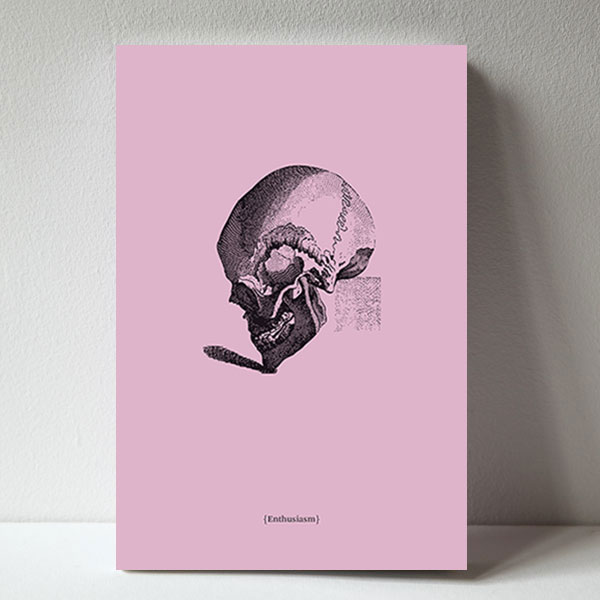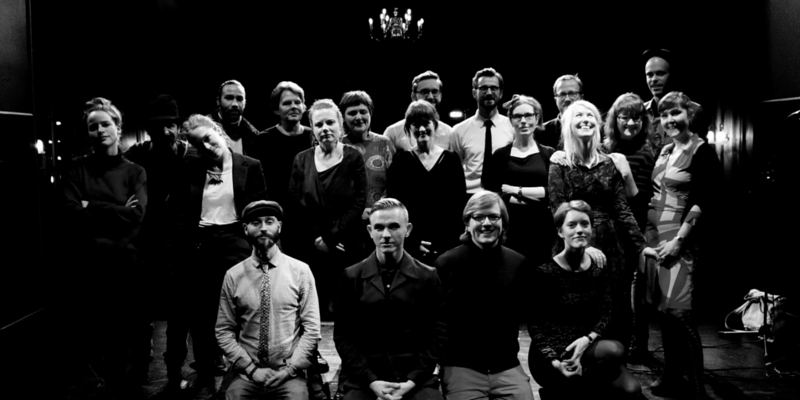{Enthusiasm} by SJ Fowler
– Reviewed by Charles Whalley –
Reading SJ Fowler’s collection {Enthusiasm} is like holding your head in front of a hose. The poems are torrents of tone, with long, deceptively conversational sentences that chain together bursts of energetic, often splenetic speech. They start and stop rather than begin and end, making an emotional sound rather than a statement or story. Unlike experimental writing by, say, Emily Critchley or Keston Sutherland, we don’t have the juxtaposition of different registers, the expansion into different vocabularies and styles. Instead, Fowler’s poems appear to use the same frantic voice split into many fragments, so there are not so much surprises of reference as surprises of address.
Illustrative of the collection, ‘As ephemeral as it is a colon’ starts:
as ephemeral as it is a colon is not a delusion
& that black > Meatgrinder > sausage.
is not actually talking but speaking so impressive
I’m not an academic said at a conference
if you say it to my face I’ll end up again
the intersection of ear & teeth the molestation
of a reality you really have no clue about
All poems should be so deliberately alien; as soon as you think you have it, something abruptly different starts up. The crucial pronoun here is not ‘I’ but ‘you’ — not quite an imagined addressee but perhaps you, you there, the reader — and it is delivered almost with menace. With a string of what things are “not”, the poem confronts us, finally, with “a reality you really have no clue about”. As if to cement the point, the poem then ends with extreme parataxis, the sentence cut by violent slashes:
a standard of living that precludes, his song
a providence / birthday / spear in the citizens
you are the housewife / I’m used to the drink
Whereas conventional poetic denouement would bring us back to ourselves, a little wiser for it, Fowler’s poems require that we relent to them or nothing. Uninterested in any idea of closure, {Enthusiasm} projects only defiance. There is something liberating and thrilling in eschewing narrative shape or progression, in ignoring any gesture towards conclusion or resolution, as the poems are free to play with their soup of poetic images, and to turn their guns on us. The result is a collection that is as exhilarating as it is baffling, and that shows great respect for the reader. It certainly isn’t about to tell us what to think.
Fowler’s poems are punctuated by images of violence, frequently as the perpetrator, as in the ear-biting above, or a nosebleed from a “whip backfist” (‘further nosebleeds’), or a “knifing boy” whose ear “rips/from the force of my punch”(‘Bath with Marlborough’), or a poem which ends “I will sink my thumbs into your jugular”(‘the baby of the north’), and so on. Male violence is explicitly discussed in ‘the Interrupters’, and seems to be an interest of the collection (and in Fowler’s other work). These moments are often the only points of clarity in the poem, as if punching their way out of the murk, as if the confrontational, confused nature of the speakers is settled with fists. Although startling and somewhat effective in a single poem, these fits of macho aggression become wearing over a long collection. Caught between the imperatives of being unconventional and of being understood, it’s as if the poems end up shouting to be heard which, for a style so linguistically interesting, seems a narrow tactic to depend upon.
*
*
Fowler has evidently found a hugely productive generative principle for his poems, having published, by his count, 7 collections, 11 collaborative publications and 8 “pamphlets/posters” since he started writing in 2010, along with poems in “over 100 magazines” and a seemingly indefatigable programme of commissions, residencies, and collaborations across the world.
He recently gave an extensive interview discussing his poetics for Sabotage, in which he defines his work against the “first-person anecdotal mode”. For him the “mainstream” displays a “profound error made about what poetry is”: that it need be “narrative, subjective, descriptive, anecdotal and sentimental”, using “language for its everyday function”. For him, this is reductive and ultimately unethical.
Whilst the mainstream is a necessary fiction for its detractors, visible in abstract but never, really and fully, in example, it’s easy to sympathise with Fowler’s stance. It’s easy to dislike the style and content of much prize-winning poetry, with its assured, insightful speakers in search of epiphanic resolution, with its quietist retreat to the natural world or into memory, with its reverence of the exotic and glamorous (and presumably expensive), of the material and linguistic markers of taste and social distinction, with its representation of the disempowered or dispossessed as the object, and never the subject, of a poem. The politics of established verse, where it has any, are mostly Lib Dem: its emphasis is on individual liberty and dignity, whilst ignoring the conditions (or privileges) through which that freedom is granted. In claiming, in its humanity, to soften the edges of C21st neoliberalism, it merely soothes the consciences of its beneficiaries. The suspicion remains that, as in much of the past, most poetry is only a store for the values of the affluent, only a ruling class talking of and for itself.
In response to the mainstream’s “profound error”, Fowler explicitly identifies himself and his work as “avant-garde”, wishing to be connected to the historical movement in the first half of C20th. (The term he chooses for himself is “vanguardist”.) For Fowler, this work is antithetical to the characteristics of the “first-person anecdotal mode”, in that it is instead about “refracting and reflecting and mulching the endless and idiosyncratic world of language”, about “making what is immensely complex in existence equally complex in language”.
Interestingly, the critical theory-inflected politics of the usual inheritors of this tradition are absent from Fowler’s interview. Avant-garde writing recently, if not always, has been overtly associated with anti-capitalism (or “politically submissive to Marxist dogma”, in Toby Martinez de las Rivas’ memorable sneer). However, for Fowler these concerns aren’t immediately apparent: the contrast with the mainstream for him is primarily a stylistic rather than a political one, about what poetry looks like rather than what poetry actually does. Perhaps he wouldn’t make this distinction; he argues in the interview that whilst his poetry doesn’t overtly deal with politics, “if political is conceived in the very form or structure of the poem, then I am political”.
When Fowler links his work to the old avant garde, he appears to do so on the understanding that he will assume the same position relative to the ‘mainstream’, that the political meaning of these forms hasn’t changed. But whereas the historical avant-garde was, according to Peter Bürger, “an attack on the status of art in bourgeois society” rather than simply on “an earlier form of art”, the avant-garde was a trick that could only be performed once. Once its audience had overcome their outrage and confusion at the avant-garde’s provocations, these works were subsumed within the norm, neutralising their political meaning. Now that, for the most part, avant-garde poets remain safely within the academy, their claims to political subversion are read as hollow. (The recent controversies over conceptualist work by self-proclaimed avant-gardistes in the US is an example.) Or, for Bürger: “Since now the protest of the historical avant-garde against art as institution is accepted as art, the gesture of protest of the neo-avant-garde becomes inauthentic.”
The objection then to ‘traditional avant-garde’ writing (i.e. writing that is eager to associate itself with an avant-garde tradition) is that it merely borrows a whiff of danger by playing the antagonist in a victor’s history, a sort of reenactment or taxidermy that obscures any actual struggle, as it portrays its spent cause as the only struggle that matters. As Cathy Park Hong has pointed out, the avant-garde in the US has, for instance, “largely ignored” innovative poetry from black and minority ethnic writers, despite the radical potential of this work. The UK is no better. We suspect that the supreme bookishness and rarefied political claims of a ‘traditional avant-garde’ serves only to protect the status of its (frequently privileged) proponents and practitioners.
This isn’t necessarily a specific censure of {Enthusiasm}. And this isn’t to claim that any poem is non-political, or that it’s possible to judge what is and isn’t, only that the political meaning of a poem is not so much what it says as what it represents in the context of its production. In this case, formally invoking a tradition isn’t the same as enacting the politics that that tradition once represented. A real, progressive successor to the avant-garde, if it’s possible, won’t be initially recognisable as such. It will likely be weird, confusing, tasteless, and definitely uncool. But, more crucially, it will arise from a context of activism, of challenge to existing gatekeepers and their biases, to the established circuitry of reading and writing and working in poetry, to the same old rows of the same old faces. Its opposition must be to the entirety of poetry’s role in culture, to its function as a social practice in an unjust society, rather than just to the form of its poems.
*
*
In this regard, Fowler’s work is dependent on the historical avant-garde’s failure, on its incorporation within institutionalised poetry, in that it signals its own not-making-sense as being the quality that is ‘poetic’. It knows comfortably that we will recognise it in its obscurity, above all, as being Poetry. Bum notes are read as expressions of ‘avant-garde-ness’, rather than, perhaps, deficiencies of craft.
As such, these poems are always in a race against themselves, always required to lapse out of meaning, lest they become too predictable. From here comes the excitement, and the frustration, of the collection: its hurry to defy and elude us. Politics aside, that’s no bad thing.





